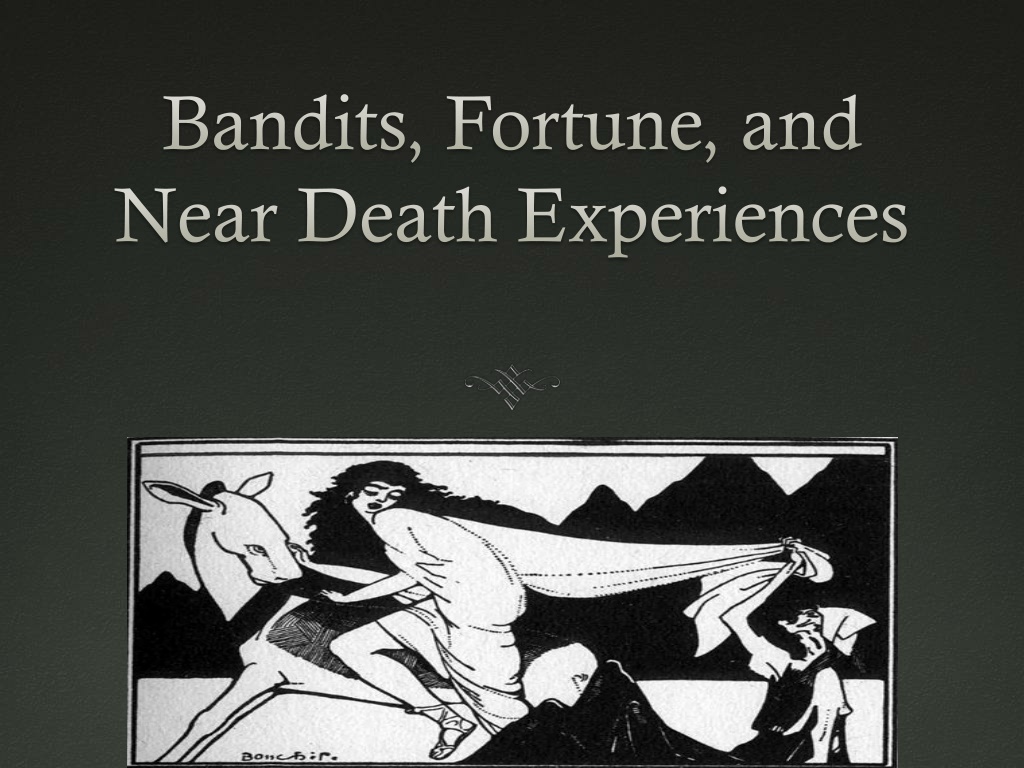
Bandits, Fortune, and Near Death Experiences Analysis
Explore the themes of cleverness, fortune, and near-death experiences in the narrative of bandits capturing Lucius and Charite, clever escape attempts, and the role of fate. Discover the intricate plot and character dynamics intertwined with concepts of Platonism and the influence of Divine Fortune.
Download Presentation

Please find below an Image/Link to download the presentation.
The content on the website is provided AS IS for your information and personal use only. It may not be sold, licensed, or shared on other websites without obtaining consent from the author. Download presentation by click this link. If you encounter any issues during the download, it is possible that the publisher has removed the file from their server.
E N D
Presentation Transcript
Bandits, Fortune, and Near Death Experiences
Plot Outline 6:25-7:15 Lucius, as well as Charite, are held captive by a group of bandits 7:15-7:16 Lucius works a grain grinding-mill 7:17- 7:24 Lucius carts timber down a mountain 8:1-8:14 Account of Charite, Tlepolemus, and Thrasyllus 8:15-8:24 Lucius accompanies a group of runaway slaves 8:25-8:31 Lucius is sold to Philebus the catamite priest
Themes present in Book 7&8 Cleverness In nearly every story a character devises a clever plan to accomplish a goal. Lucius attempting to escape the bandits and the boy in the woods Tlepolemus pretending to be Haemus the notorious bandit Thrasyllus pretending to be a friend of Tlepolemus Makes the death of Tlepolemus appear to be a hunting accident Charite inviting Thrasyllus into her home
Themes continued Fortune & fortune Despite the cleverness of the characters examined, each of them eventually succumbs to their fate. Charite attempts to escape the bandits atop Lucius, but is captured shortly thereafter. Lucius eventually escapes the bandits with Charite and Tlepolemus, but does not receive the rewards promised to him. Thrasyllus kills Tlepolemus, but still does not win the heart of Charite.
Fortune & fortune continued In each of these stories the characters are subject to both: Fortune the goddess fortune their general fate or destiny. Throughout the Metamorphoses personified Fortuna is used as a narrative device to introduce a turn in an incident or a new stage of the adventures The mortal efforts of the characters to change their misfortune is useless against the divine whims of Fortune.
Philebus the Priest Worshipper of a Syrian goddess Catamite
Platonism in Phelebus In a dialogue with Socrates, a character by the name of Philebus defends the life of pleasure and hedonism. In naming a catamite priest Philebus, Apuleius is using the foul practices of the priest as a logical conclusion of the philosophy endorsed by Philebus of the Socratic dialogue.
Discussion Questions In his chapter Cleverness and Fortune , Carl Schlam argues that characters in The Golden Ass are often unable to escape misfortune regardless of how clever they might be. Is Apuleius attempting to send a message that the reader should be content with their circumstances because fate is out of their hands? Or is it possible Apuleius is trying to say that only through the most clever and well thought-out plans can one escape misfortune? After Lucius is sold to the priest Philebus, several of his behaviors are described in sections 27-29. Namely, the priest and his religious followers are described as catamites, which in modern usage describes the young male counterpart of pederastic relationship but is likely describing homosexuals in this context. What, if anything, can we learn about Roman attitudes about homosexuality and gender roles in examining Philebus?






















